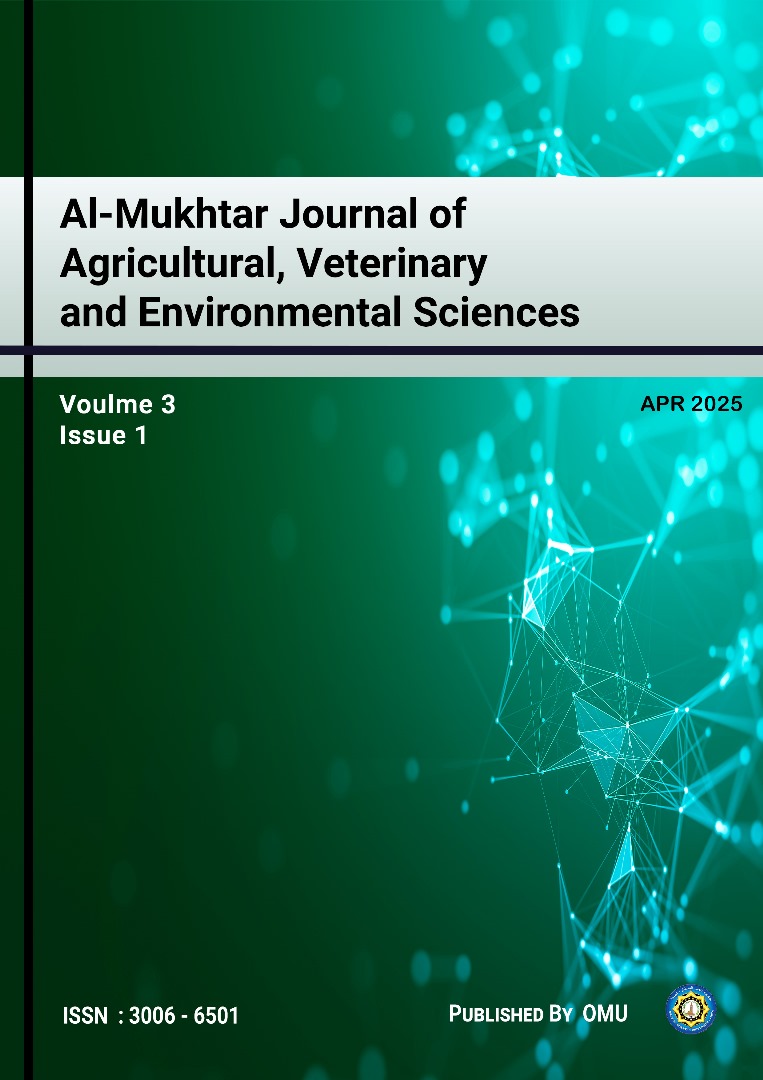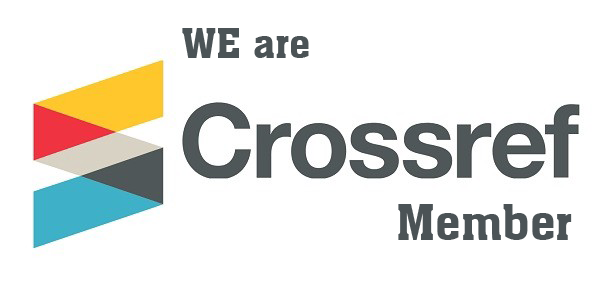Impact of Six Distinct Growth substrates on the Survival and Root Elongation of Grafted Tomato and Pepper Seedlings
DOI:
https://doi.org/10.54172/wxn6q608Keywords:
Peat moss; Sand; Survival; Grafting; Root elongation; Splice.Abstract
A study was conducted at the Horticulture Department at Omar Al Mukhtar University, Al Jabal Al-Khader, Libya in 2022 to investigate the impact of six growth media; peat moss, sand, soil, peat moss and sand (1:1), peat moss and soil (1:1), and soil and sand (1:1), on the survival and root elongation of grafted tomato (Solanum lycopersicum) and sweet pepper (Capsicum annuum) seedlings. The experiment comprised 12 treatments representing all combinations of the two factors and followed a randomized complete block split-plot design with 4 replications. Findings indicated that among the growth substrates tested, peat moss, followed by the combination of peat moss and sand, exhibited the highest survival rates and root elongation for grafted tomato and pepper seedlings, surpassing the outcomes observed with alternative treatments
References
Alam, M., Hussain, Z., Ullah, I., Samiullah, Ahmad, I., Asif, M., Shah, M. A., Shah, S. Q. A., &
Khan, J. R. (2020). Effect of growing media on rooting response of tomato (Lycopersicum esculentum L.) stem cuttings. Pure and Applied Biology, 9(1), 884–896.
https://doi.org/10.19045/bspab.2020.90093.
Bahadur, A. and Kumar, R. (2024). Grafting in Tomato for Improving Abiotic Stress Tolerance,
Yield and Quality Traits. Vegetable Science 51(spl): 22-33.
Buojaylah, F., Castrejon, Y., & Wang, Z. (2014). Evaluating Trichoderma-containing Biofungicide
and Grafting for Productivity and Plant Health of Triploid Seedless Watermelon in California’s
Commercial Production. HortScience 59(12):1709–1717.
https://doi.org/10.21273/HORTSCI18048-24.
Dabirian, S., Inglis, D., & Miles, C. A. (2017). Grafting watermelon and using plastic mulch to control Verticillium wilt caused by Verticillium dahliae in Washington. HortScience, 52(3), 349–356.
https://doi.org/10.21273/HORTSCI11403-16.
Davis, A. R., Perkins-Veazie, P., Sakata, Y., Lopez Galarza, S., Maroto, J. V., Lee, S. G., Huh, Y.
C., Sun, Z., Miguel, A., King, S., Cohen, R., & Lee, J. M. (2008). Cucurbit grafting. Critical Reviews in Plant Sciences, 27(1), 50–74. https://doi.org/10.1080/07352680802053940.
Erdal, İ., Aktaş, H. (2025). Comparison of the Perlite, Leonardite, Vermicompost and Peat Moss
and Their Combinations with Cocopeat as Tomato Growing Media. J Soil Sci Plant Nutr.
https://doi.org/10.1007/s42729-025-02294-2.
Fernandez-Garcia, N., Carvajal, M., & Olmos, E. (2004). Graft union formation in tomato plants:
Peroxidase and catalase involvement. Annals of Botany, 93(1), 53–60. 10.1093/aob/mch014.
Gardner, C. M. K., Laryea, K. B., & Unger, P. W. (1999). Soil physical constraints to plant growth
and crop production. Food and Agriculture Organization of the United Nations.
Gruda, N. (2019). Increasing sustainability of growing media constituents and stand-alone substrates in soilless culture systems. Agronomy, 9(6), 298. https://doi.org/10.3390/agronomy9060298.
Johnson, S., & Miles, C. (2011). Effect of healing chamber design on survival of grafted eggplant,
tomato, and watermelon. HortTechnology, 21(6), 752–758.
https://doi.org/10.21273/HORTTECH.21.6.752.
Kawaguchi, K., Notaguchi, M., Okayasu, K., Sawai, Y., Kojima, M., Takebayashi, Y., Shiratake,
K. (2024). Plant hormone profiling of scion and rootstock incision sites and intra- and inter-family
graft junctions in Nicotiana benthamiana. Plant Signaling & Behavior, 19(1).
https://doi.org/10.1080/15592324.2024.2331358.
Lee, J. M., Kubota, C., Tsao, S. J., Bie, Z., Echevarria, P. H., Morra, L., & Oda, M. (2010). Current
status of vegetable grafting: Diffusion, grafting techniques, automation. Scientia Horticulturae,
127(1), 93–105. https://doi.org/10.1016/j.scienta.2010.08.003.
Lohani, S., Adhikari, S., Aryal, L. N., Bhusal, Y., Kadariya, M., & Aryal, S. (2023). Evaluation of
Different Growing Media for Tomato and Sweet Pepper Seedlings Raising in Pokhara, Nepal.Journal of Agriculture and Environment, 24(01), 109–118.
https://doi.org/10.3126/aej.v24i01.58176.
Nagila, A., Crosby, K. M., & Leskovar, D. I. (2025). Evaluating suitable rootstocks for grafting in
organic pepper system. HortScience, 60(1), 5–16. https://doi.org/10.21273/HORTSCI18132-24.
Oberpaur, C., Puebla, V., Vaccarezza, F., & Arévalo, M. E. (2010). Preliminary substrate mixtures
including peat moss (Sphagnum magellanicum) for vegetable crop nurseries. Ciencia e Investigación Agraria, 37(1), 123-132. Retrieved from http://www.rcia.uc.cl.
Reshma, A., Syed, S., Reddy, P. S., Priya, T. B., Madhuri, K. V. N., & Padmaja, V. V. (2024). Effect of grafting on growth, yield, quality and nutrient uptake in tomato. International Journal of Agriculture, Biology & Research (IJABR), 8(10), 361–367.
https://doi.org/10.33545/26174693.2024.v8.i10e.2519.
Rivard, C. L., & Louws, F. J. (2006). Grafting for disease resistance in heirloom tomatoes. North
Carolina State University Cooperative Extension Service. https://content.ces.ncsu.edu/grafting-fordisease-resistance-in-heirloom-tomatoes.
Sakata, Y., Ohara, T., & Sugiyama, M. (2007). The history and present state of grafting in Japan.
Acta Horticulturae, 731, 159–170. https://doi.org/10.17660/ActaHortic.2007.731.23.
Wimer, J., Inglis, D., & Miles, C. (2015). Evaluating grafted watermelon for Verticillium wilt severity, yield, and fruit quality in Washington State. HortScience, 50(10), 1332–1337.
Downloads
Published
License

This work is licensed under a Creative Commons Attribution-NonCommercial 4.0 International License.













